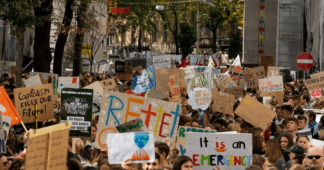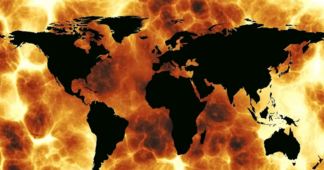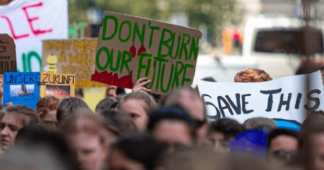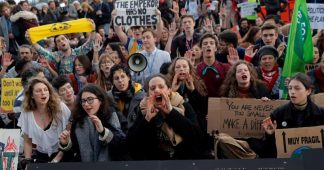“The deal on the table is a death sentence for millions of those on the frontlines.”
By Julia Conley
After nearly two weeks of negotiations, the United Nations Climate Change Conference in Glasgow, Scotland was expected to extend into the weekend Friday as policymakers missed the evening deadline for finalizing their deal on how countries will combat the climate crisis—with leaders unable to come to an agreement thus far regarding financial support for the Global South, fossil fuel subsidies, and other key issues.
Hundreds of campaigners representing Indigenous communities, young people, and civil society groups poured into the hallways of the venue where COP26 is taking place, chanting, “Keep 1.5°C Alive” and condemning political leaders for failing to deliver an agreement that will limit global heating to 1.5°C above pre-industrial levels by the end of the century.
Advocates called the demonstration a “people’s plenary” and proceeded out into the street for a rally with members of Extinction Rebellion and Fridays for Future.
“This is the real atmosphere of people fighting for their needs,” Katarzyna Niemier, a climate activist from Poland, told The Washington Post.
Huge crowd of protestors from the movements for #ClimateJustice including the large numbers who walked out after the #PeoplesPlenary outside the gates of #COP26 chanting "Keep 1.5 Alive!"#ClimateJustice #JustTransition
Credit: @agisilaos_k Agisilaos Koulouris | #COPCollab26 pic.twitter.com/sHKpJK3pND— COP26 Coalition (@COP26_Coalition) November 12, 2021
“This is the real atmosphere of people fighting for their needs,” Katarzyna Niemier, a climate activist from Poland, told The Washington Post.
Despite warnings from the Intergovernmental Panel on Climate Change (IPCC) and climate scientists around the world that allowing the Earth’s temperature to rise above the 1.5°C threshold will lead to irreversible damage to the environment and will prove deadly for people in frontline communities across the globe, experts say the negotiations during COP26 have put the planet on track for warming between 1.8°C and 2.5°C.
Climate justice advocates including the campaign group Corporate Accountability expressed outrage at the “lack of equity, urgency, and ambition by world ‘leaders’ and wealthy nations.”
“Climate action means rejecting big polluter schemes like carbon markets, paying up for loss and damage, and advancing real solutions like making polluters pay,” tweeted Corporate Accountability late Thursday.
As Common Dreams reported Friday, the draft text that was presented the day the summit had been scheduled to end was widely condemned for weak language regarding the phasing out of coal power and fossil fuel subsidies.
While “pledging to keep 1.5 alive,” said Corporate Accountability, leaders have failed “to deliver on any meaningful pathway to do so.”
“The deal on the table is a death sentence for millions of those on the frontlines,” the group added.
Campaigners condemned the leaders’ insistence on including language that leaves the door open for “techno-fixes” and “false solutions” like carbon capture technology.
The draft decision “is massively killing the Paris agreement,” said Meena Raman of Third World Network and Friends of the Earth Malaysia. “No finance, no technology transfer, no adaptation, no loss and damage.”
As Common Dreams reported earlier this week, countries in the Global South not only face an existential threat from extreme weather events brought on by the climate emergency in the coming years—illustrated by Tuvalu Foreign Minister Simon Kofe, who addressed the summit standing in knee-deep water—but also are expected to lose an average of 20% of their gross domestic product in the next three decades, and 64% by 2100, if the 1.5°C threshold is crossed.
Meanwhile, a $100 billion annual funding pledge made by wealthy countries, with the aim of helping developing nations mitigate the climate crisis, is now scheduled to be delivered starting in 2023—three years late.
The draft text noted “with deep regret” the failure to provide the funding, and called for a doubling of funds by 2025, but leaders have not reached an agreement on providing new financing to help with the damage that has already been done. The text included language calling only for a “technical assistance facility” to aid countries that have suffered losses and damages.
“The wealthiest have said that their coffers are empty, treating climate finance as if it were some loose change to be found down the back of the sofa,” said Asad Rehman of War on Want. “In 2021, this new text may have plenty of warm words to acknowledge and ‘urge’ when what we really needed was will, and what we needed when your house is on fire. And for those trapped in that fire, not for us to acknowledge that there is a fire or that we should ring the fire brigade, but to actually act.”
With the negotiations stretching into the weekend, advocates expressed hope that more progress can be made before the summit comes to a close.
“As the clock ticks on COP26 and the window closes to keep warming below 1.5°C,” said Corporate Accountability, “the climate justice movement has provided an alternate decision to governments—there is still time to act.”
Published at www.commondreams.org
We remind our readers that publication of articles on our site does not mean that we agree with what is written. Our policy is to publish anything which we consider of interest, so as to assist our readers in forming their opinions. Sometimes we even publish articles with which we totally disagree, since we believe it is important for our readers to be informed on as wide a spectrum of views as possible.











